Irish authorities have dismantled another “tent city” in Dublin as the country continues to face an influx of migrants, many of whom have arrived from the UK.
Asylum seekers had pitched more than 100 tents in a makeshift camp along Dublin’s Grand Canal, just steps from the International Protection Office, as the government struggles to provide them with accommodation.
Footage shows the early morning operation, in which teams checked the tents were empty before painting them with an “X” and loading them onto a truck with a grabber machine.
The camp sprang up along the waterway just days after more than 200 asylum seekers were evacuated from a similar makeshift camp on nearby Mount Street.
The expulsion comes amid an ongoing dispute with the UK government over asylum seekers crossing the border from Northern Ireland, with claims they do so to avoid deportation to Rwanda.
The tents were painted with an “X” before being moved to a truck by a “grabber” machine.
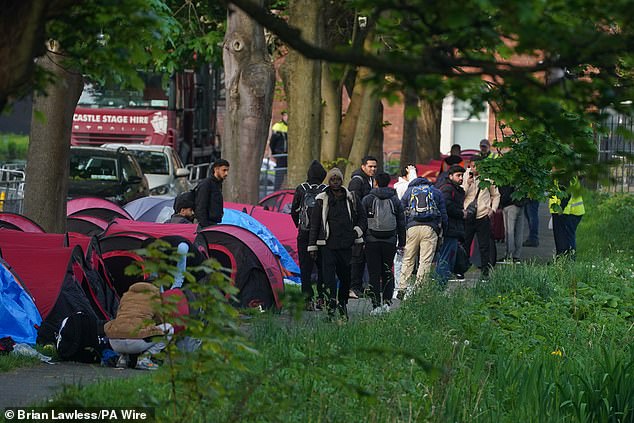
The men living in the tents were seen leaving the area ahead of the evacuation operation this morning.
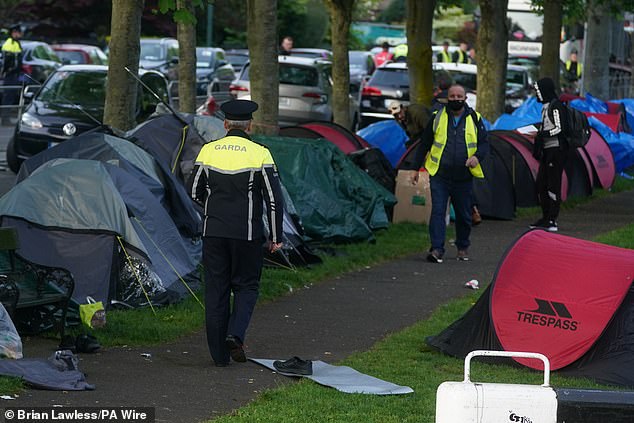
Gardai were seen searching the area prior to the removal while the road was closed to traffic.
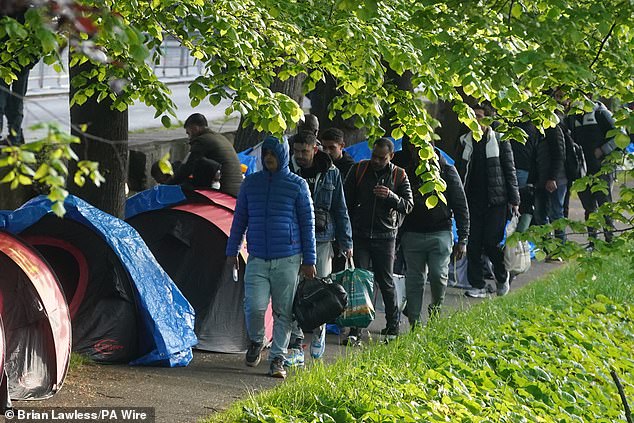
A large number of asylum seekers reportedly boarded buses at 7.30am this morning.
The Irish government said Thursday morning’s operation involved the Irish police service, Dublin City Council, the national health service, the Department of Integration and a waterways authority.
It was carried out more quickly than the previous operation last week, in which people who had been living in the roadside camp for months were expelled.
According to reports, a large number of asylum seekers boarded the buses at 7.30am today, and the operation concluded at 7.45am.
The Irish government said all asylum seekers were moved to accommodation in County Dublin, with a total of 186 seekers housed in the suburb of Citywest and 99 in Crooksling, an hour from the city center in the Dublin Mountains. .
A Government statement said: “The purpose of the operation is to ensure the safe movement of people seeking international protection from tents on the Grand Canal to accommodation designated by the International Protection Accommodation Service (IPAS).
‘IPAS designated accommodation has toilets and showers; Health services; indoor areas where food is provided; facilities for charging phones and personal devices; access to transport to and from Dublin city centre; and 24-hour on-site security.’
Speaking in parliament on Wednesday, Irish Prime Minister Simon Harris said last week’s similar operation had a “very positive impact” and averted a “near public health emergency.”
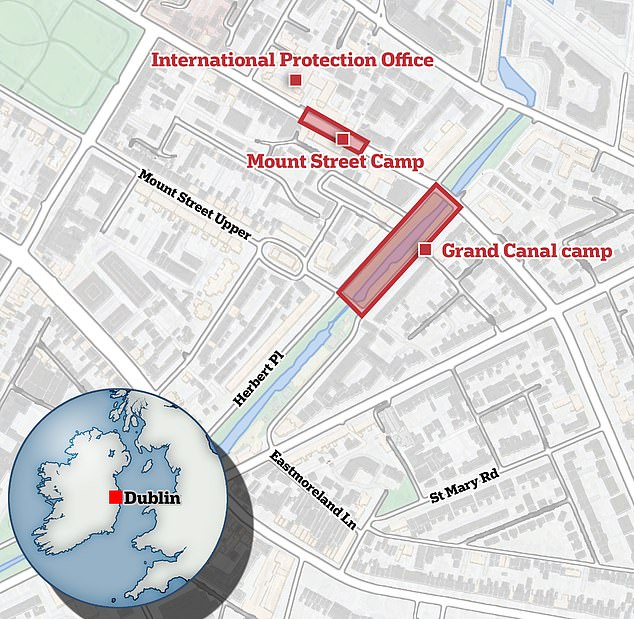
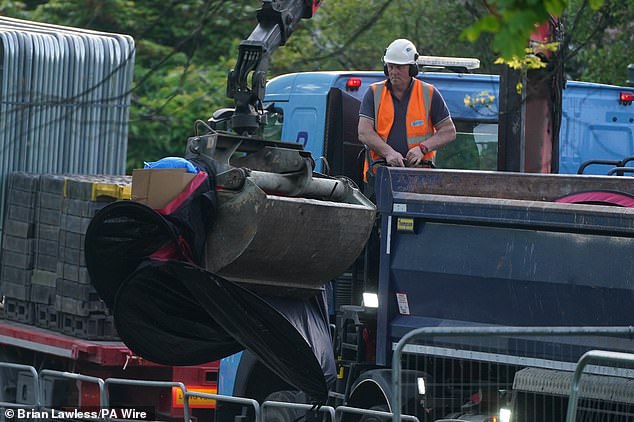
A crane operator removes the tents from the waterfront and loads them onto a truck to take them away.
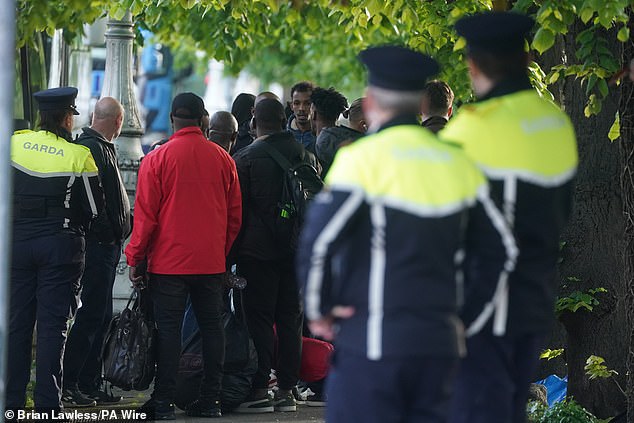
The operation involved the Irish Police Service, Dublin City Council, the National Health Service, the Department of Integration and a waterways authority.
He said: ‘I still believe it was the right action to take. I became Taoiseach four weeks ago and I took charge of this situation.
‘In my view, there was a tacit acceptance by many state agencies that the situation at Mount Street could continue and that it was simply the new norm. That wasn’t right.’
And he added: ‘We will deal with the Grand Canal. “Measures will be taken.”
Justice Minister Helen McEntee, who recently claimed that more than 80 per cent of migrants to Ireland arrive through Northern Ireland to avoid deportation to Rwanda, said the government must ensure that a tent city does not I am back.
‘Once people are moved, measures will be put in place to ensure it doesn’t happen again.
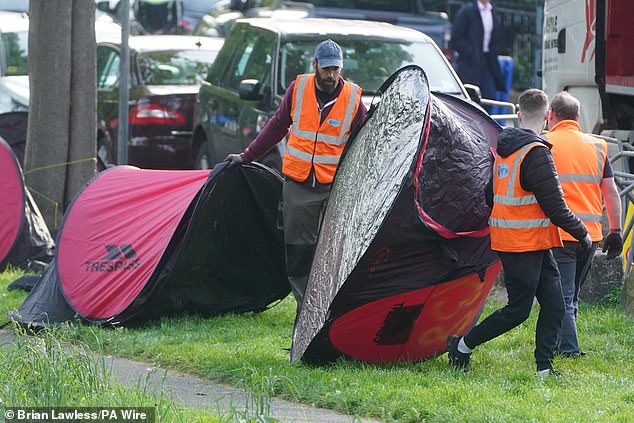
Crews removed tents outside the area, which was closed to pedestrians and cyclists during the operation.
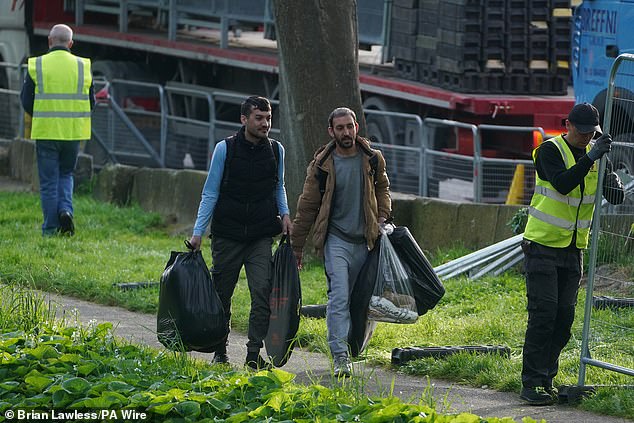
Asylum seekers leave with their belongings during a morning operation by Irish authorities to remove tents.
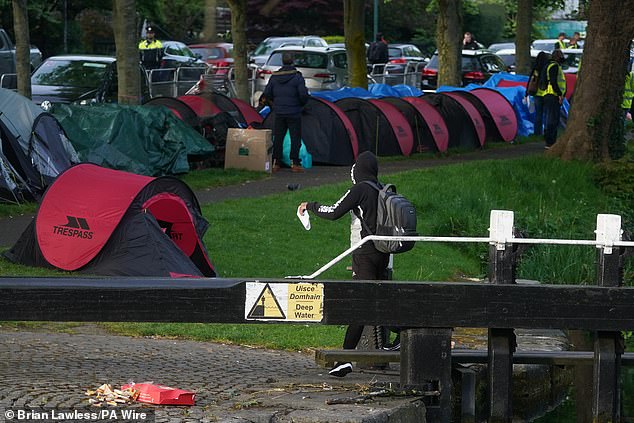
Asylum seekers moved into the area after another makeshift migrant camp surrounding the International Protection Office (IPO) in Mount Street, Dublin, was dismantled last week.
“When they are provided with that accommodation, it is also very important that we do not see scenes like we are seeing now on Mount Street again, that it cannot re-emerge, that we have hundreds of tents, not just outside the international precinct.” protection office, but outside people’s homes and businesses.’
Tensions between London and Dublin over migration have increased in recent weeks, with each blaming the other for their immigration problems.
Rishi Sunak declared last month that he is “not interested” in taking in migrants from Ireland as the EU refuses to take in English Channel migrants who arrived from France.
His comments were a harsh response to senior Irish ministers who warned they would draw up emergency laws to force refugees to return to the UK.
Taoiseach Simon Harris has pledged to pass new laws to facilitate the return of migrants after the country’s courts declared the UK cannot be classed as “safe” due to its pact with Rwanda.
But the UK Government said it would ignore any laws passed by Ireland, with a No 10 spokesperson stating: “Even if Ireland were to pass legislation, it is up to the UK Government to decide who it accepts or does not accept into the country.”
“We are not going to start accepting returns from the EU, in the same way that France does not accept returns from the UK.”
Amid domestic pressure to get asylum seekers off the streets and into accommodation, Harris defended her government’s handling of the issue last Friday.
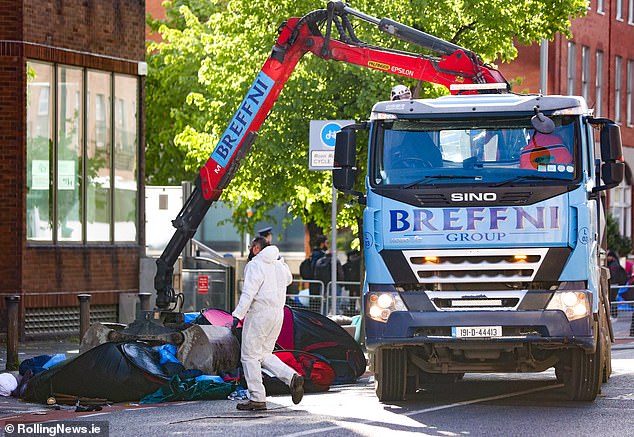
A truck-mounted crane was even deployed to tear the canvas structures from the pavement and deposit them in a container on May 1.
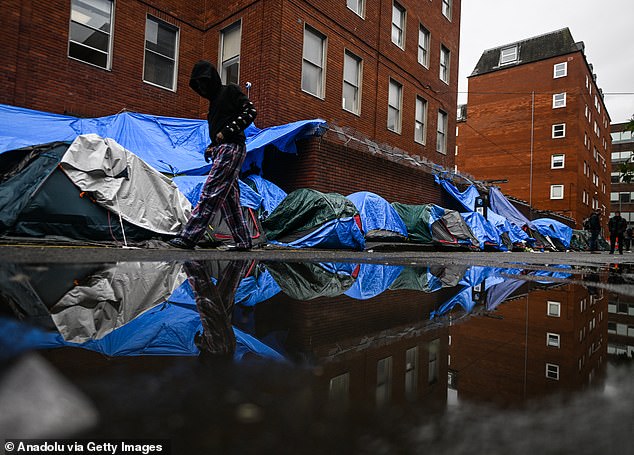
The tents are clustered near the International Protection Office in Dublin and serve as temporary homes for asylum seekers on April 30, 2024.
He said “makeshift camps” on public roads and trails were illegal and “never the solution.”
“It is also not in the interest of the people who sleep in those tents, people who do not have access to adequate health services,” he said.
Harris added: “We work on this every day, but I need to be clear and honest with people coming to our country – we are doing everything we can under very difficult and challenging circumstances to accommodate them.”
‘But there is not always accommodation available, but we continue to work on it day by day.
‘The conversation about migration cannot just be about accommodation, because no matter how much accommodation you have, if it is only a conversation about accommodation, the accommodation will be full.
“There also needs to be a conversation about faster processing times, about efficient and effective systems.”

